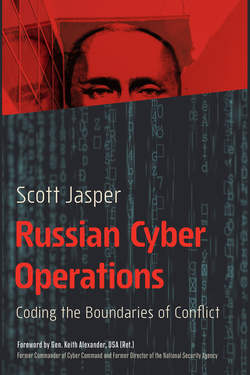Читать книгу Russian Cyber Operations - Scott Jasper - Страница 11
На сайте Литреса книга снята с продажи.
Conceptual Foundations
ОглавлениеRussia seeks to restore its status as an independent great power. The long-term ambition of President Vladimir Putin and that of his inner circle is for Russia to resume on its own terms what they decree to be a rightful geopolitical position.13 That position is as one of the two or three most important nations in the world.14 To achieve this obsessive ambition, Russia competes against the United States and its allies and partners.15 Russia competes across “political, economic, and military arenas” using “technology and information to accelerate these contests in order to shift regional balances of power in their favor.”16 The reemergence of long-term, strategic competition challenges the prosperity and security of the United States and its allies and partners. In the decades after World War II, these nations “constructed a free and open international order to better safeguard their liberty and people from aggression and coercion.”17 The Western concept of international order is generally defined by its alliances, institutions, and rules.18 However, today, according to Gen. Curtis M. Scaparrotti, the commander of US European Command, Russia is “engaged in strategic competition” while “pursuing a strategy that undermines the international order.”19 Russia does this “within the system by exploiting its benefits while simultaneously undercutting its principles and rules.”20 Russia perceives itself to already be in conflict with the West, led by the United States.21 This perception drives actions by Russia in a wide range of domains, including cyberspace, and also in disinformation campaigns and military interventions in third countries. The debate is perpetual over whether Russia believes “it is defending itself against an actual and genuine threat from the West or is simply expressing its nature as an unreconstructed expansionist power.”22
Cyber operations have become a central aspect of Russian forms of conflict or competition. Cyber operations are defined as “the employment of cyberspace capabilities where the primary purpose is to achieve objectives in or through cyberspace.”23 The domain of cyberspace consists of “the interdependent network of information technology infrastructure and resident data,”24 whereas a cyberspace capability is a “device or computer program, including any combination of software, firmware, or hardware, designed to create an effect in or through cyberspace.”25 Examples of cyber operations include those operations that “use computers to disrupt, deny, degrade, or destroy information resident in computers and computer networks, or the computers and networks themselves.”26 In regard to what is meant by an effect “in cyberspace,” an example would be the deletion of resident data, while an effect “through cyberspace” would be the destruction of connected equipment. A cyber incident is the result of a single cyber operation, whereas a cyber campaign is a planned series of cyber operations, over time, designed to accomplish objectives.27 Russia has expanded long-term strategic competition with the United States and its allies and partners with persistent campaigns “in and through” cyberspace.28
The United States intends to “work with like-minded partners to attribute and deter malicious cyber activities with integrated strategies that impose swift, costly, and transparent consequences.”29 Although the extent of that response is limited by attribution to the responsible state under international law, US military doctrine clearly delineates that “to initiate an appropriate defensive response, attribution of threats [actors] in cyberspace is crucial for any actions external to the defended cyberspace.”30 Furthermore, the doctrine states that “the most challenging aspect of attributing actions in cyberspace is connecting a particular cyber-persona or action to a named individual, group, or nation-state, with sufficient confidence and verifiability to hold them accountable.”31 Russia uses uncertainty in technical attribution and ambiguity in legal classification to evade repercussions for covert actions that routinely fall below the threshold of armed conflict. A thorough examination of the role and use of Russian cyber operations in their methods of conflict and competition is imperative for formulating and deciding on cost-imposition options or defensive-solution choices to counter them.
